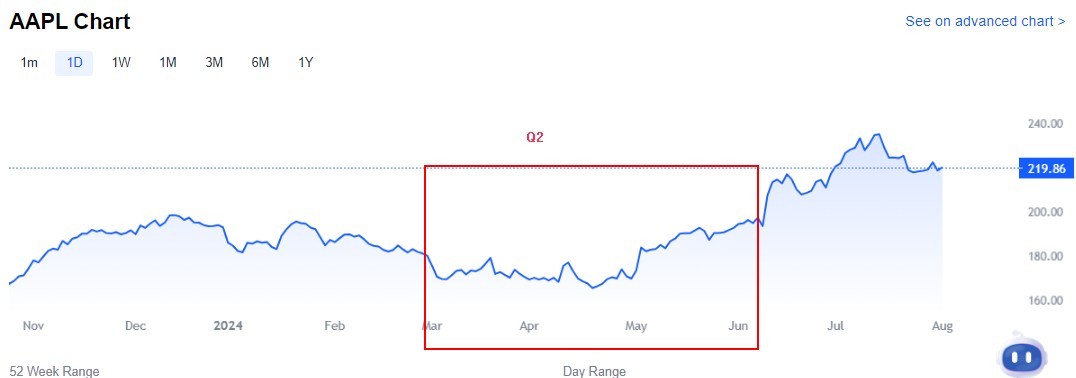Buffett Cuts Apple Shares by Half, Cashes Out $70 Billion; Will Explode the Market
Following the disappointing U.S. non-farm payroll report, which fueled recession fears and led to broad losses across stocks, Buffett's latest move has once again dealt a heavy blow to financial markets. Just now, Buffett's Berkshire Hathaway announced that it has significantly reduced its Apple holdings, cashing out approximately $70 billion.
On Saturday, Berkshire Hathaway released its quarterly report for the period ending June 30. Despite exceeding expectations in both revenue and net income, its cash reserves hit a new record high at the end of the second quarter, reaching $276.9 billion, a staggering 46% increase from the previous quarter. During this period, the Oracle of Omaha sold $75.5 billion worth of stocks, marking the seventh consecutive quarter of net sales, with the amount exceeding the total of the previous six quarters combined. Among these, the largest holding, Apple, saw its shares reduced from 789 million shares in the first quarter to around 400 million shares.
According to the latest disclosed financial report, as of the end of the second quarter, approximately 72% of Berkshire Hathaway's stock holdings were concentrated in five companies: Apple, Bank of America, American Express, Coca-Cola, and Chevron. The market values of these holdings at the end of the quarter were $84.2 billion, $41.1 billion, $35.1 billion, $25.5 billion, and $18.6 billion respectively. Apple remains the largest single holding, but its share of the disclosed assets has dropped from 50.19% in the previous quarter to about 30%.
Given that Apple's stock price was hovering around $180 per share in the second quarter, Buffett's cash-out amounted to approximately $70 billion. Notably, since Apple unveiled its AI product (Apple Intelligence) at the WWDC in June, its stock price has further climbed, closing at $219.86 per share last Friday. Therefore, in the short term, Buffett's move seems to be a missed opportunity in terms of maximizing profit.

However, for the Oracle of Omaha, who has long admired Apple's business model and enjoyed substantial dividend returns, the cash-out clearly isn't about short-term gains. Since Buffett began buying Apple shares on the influence of his deputies in 2016, he continued to increase his stake from 2017 to 2023, making it Berkshire's largest investment. Buffett has even called Apple the second most important business after his cluster of insurance companies. Buffett praised Apple as probably the best business I know in the world, and referred to Tim Cook as the best partner Apple could have after Steve Jobs.
Buffett emphasized at the time: Unless something dramatic happens that changes capital allocation, we intend to hold Apple as our largest investment. However, such a significant reduction in holdings now raises doubts about the Oracle of Omaha's intentions.
It's worth noting that this marks the third consecutive quarter in which Buffett has reduced his Apple holdings, with this quarter's reduction being particularly drastic. In the first quarter, Buffett sold 116 million shares, and in the fourth quarter of last year, he sold nearly 10 million shares. But this time's sale of 389 million shares demonstrates a much larger scale of divestment.
Buffett explained at the May shareholder meeting that the reduction was due to tax considerations. He is currently paying a 21% federal tax rate on the gains from investing in Apple shares, which was recently 35%, and in earlier years was 52%. Considering the current U.S. fiscal policies, a higher tax rate is possible in the future. Given the potential tax rate increase, shareholders should not mind him selling some Apple shares this year. We will still hold Apple, Coca-Cola, and American Express stocks in the long term, and this strategy has already seen much success in the past, he said.
However, investors who took him at his word might be surprised. Even considering tax reasons, who would further reduce their number one holding by $70 billion in the second quarter? The reason for this massive sell-off could be a concern about Apple's fundamental outlook worsening or a warning about the high valuation of U.S. stocks.
On the other hand, the recently disclosed non-farm payroll report also missed expectations significantly. In July, U.S. non-farm employment rose by just 114,000, compared to the expected 185,000, while the unemployment rate further rose to 4.3%, the highest since October 2021. Some institutions have warned that the risk of a U.S. economic recession is drastically increasing. According to the Sahm Rule, when the three-month average unemployment rate rises by 0.5 percentage points or more from its previous 12-month low, it typically signals an early stage of recession in the United States. While this information is recent, it's likely that the well-versed Oracle of Omaha has been re-evaluating based on worsening economic forecasts. After all, in turbulent times, cash is king.
As for the real reason behind this large-scale sell-off, Buffett is expected to provide an explanation soon. However, if the reasoning continues to be tax-related, it is unlikely to convince many investors. What is certain, though, is that Apple may face significant volatility when markets open on Monday.
Manténgase al tanto de las noticias de Wall Street en tiempo real.
Latest Articles
Stay ahead of the market.
Get curated U.S. market news, insights and key dates delivered to your inbox.

Comments
No comments yet